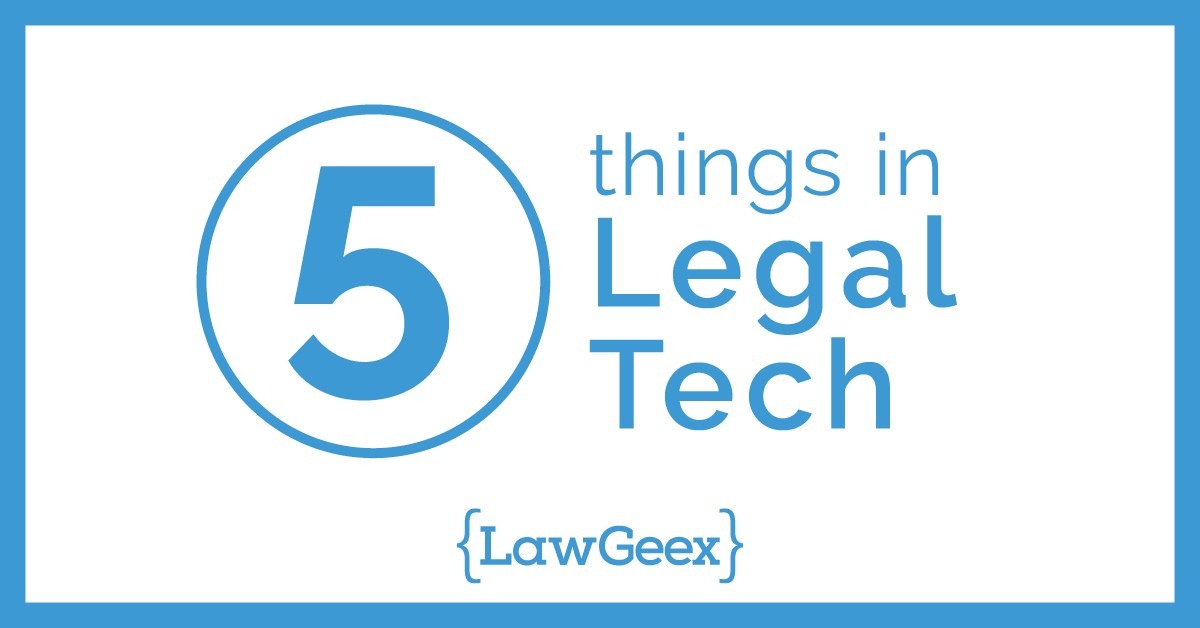Your time is short. This quick read gives you 5 things you need to know from LegalTech in the past seven days.
1
The Empire Strikes Back: Westlaw launches new AI
Introducing Westlaw Edge, the most intelligent legal research platform ever. Experience it for yourself today: https://t.co/XJ0i0UpixO #WestlawEdge pic.twitter.com/b1nNlzSOY2
— Thomson Reuters Westlaw (@Westlaw) July 12, 2018
“I think we all suspected that Thomson Reuters had something big in the works,” says Jean O’Grady, a lawyer, law librarian, and blogger. “After all, it has been eight years since their last major launch.”
With the launch of Westlaw Edge this week, legal research giant Westlaw announced “its most significant legal release since Westlaw Next in 2010,” says Zach Warren in Legaltech News. For Bob Ambrogi, lawyer and legal technology expert, Westlaw Edge offers “advanced artificial intelligence and analytics with the goal of helping legal professionals find answers and perform research more efficiently and with better results.” Features include a first-of-its-kind “risk analysis” for case law which is no longer good but has not been explicitly overruled. It also includes integrated litigation analytics, providing docket analytics, covering judges, courts attorneys and law firms. Grady argues,“I think Thomson Reuters took a big gamble waiting this long to enter the analytics market and to turbo-charge their search engine with a suite of AI tools, but I am certain that of these new features will cause firms to take a long hard look at Westlaw Edge.” Bob Ambrogi concludes, “If the actual product lives up to the presentation I saw yesterday, then it is a major step forward, not only for Thomson Reuters but for the industry.”
Not to be outdone, LexisNexis launched Lexis Analytics. Following a buying spree (purchasing Lex Machina, Intelligize, and Ravel Law) the new product offers litigation analytics, and a new offering called Context, analyzing the language and cases judges cite most in their opinions.
Legal research AI company Ross Intelligence also announced its core product can now be used by researchers in every area of American law.
2
The UK and LegalTech
The UK legal market is valued at almost $26 billion a year, writes Charlotte Jee in TechWorld, but in many ways, the industry is “outdated inaccessible and expensive”. She profiles five UK LegalTech startups tackling inefficiencies in the sector: Libryo (SaaS for regulatory law); CrowdJustice (crowd-funding litigation); Alacrity (tech to enhance the relationship between corporates and law firms) Luminance (AI due diligence, compliance, and insurance) and Lexoo (online access to a vetted international network of lawyers).
However, a report suggests that UK Legal Departments are falling behind the United States in tech use. Acritas finds that 25 percent of legal departments in the UK are not using any technologies while only 11% of legal departments are in the same situation. For instance, 61 percent of US legal departments use e-signature compared with 49 percent of legal departments in the UK.
3
LegalTech acquisitions: Seal buys Apogee
Just three weeks after receiving $30 million in funding, legal AI contract due diligence, company Seal Software, has bought out US-based Apogee Legal, a contract analytics business that it has been working with for several years, says Richard Tromans in Artificial Lawyer. Tromans argues that “this is further proof that the legal AI sector is in tremendous form at the moment.”
Facebook’s vacuuming up of another startup may not appear to have much to do with legal. But Rhys Dipshan in LegalTech News says Facebook’s acquisition of Bloomsbury AI to combat fake news saw legal was a missed opportunity for legal because it was one of the startups participating in Allen & Overy’s Fuse incubator (helping develop legal technology). However, concedes Shruti Ajitsaria, head of Fuse, “We were only getting started when they were bought by Facebook.”
4
Funding of the week
LegalZoom has invested $1.8m in Australian legal tech company LawPath. According to Legal IT Insider, this will help “expand LawPath’s extensive reach of services, which, much like LegalZoom include online legal documents and supporting services.” Since launching in 2013, more than 60,000 Australian businesses and individuals have used LawPath to start a business, register a trademark, create legal documents, or hire a lawyer online.
5
How to be a top GC (it’s not what you think)
In a LinkedIn piece, The Only Career Lesson I Have To Offer, Matt Fawcett, General Counsel of Fortune 500 tech company NetApp, offers lessons on his route to the top of the legal profession. He advises simply: “Stop planning”, arguing that the detours have helped him throughout his career. “Looking back, I see that I took a long and winding road, and came away better for it. I absorbed new perspectives and ideas that helped me grow in ways I didn’t appreciate at the time. I made plenty of mistakes and suffered plenty of frustrations along the way, but also learned about my profession and myself. I figured out what I liked and was good at, and came to grips with the fact that it was very different from what I expected.”
- The legal tech market size and growth in the past year
- The definitive step-by-step guide on how to buy legal tech from Lucy Bassli, former Assistant General Counsel at Microsoft
- First person accounts of legal tech buying by leading legal department leaders at the world’s top companies, including Facebook, Google, NetApp, McDonald’s, AIG, Twitter and many more
- 130+ top technology solutions for legal departments
- Explanations of an in-house legal tech buying journey, including barriers to adoption, establishing and monitoring KPIs, and more


